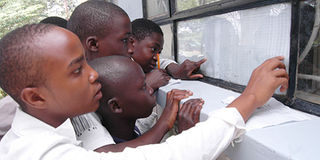Top counties to be known as KCPE results out Wednesday

Photo/FILE
KCPE candidates at Menengai Primary School in Nakuru Municipality check their exam results at the school’s notice board in December 2010. This year's result will be released on December 28, 2011.
Candidates will for the first time be ranked according to their counties in this year’s Standard Eight national examinations results to be released on Wednesday.
Kenya National Examinations Council (Knec) secretary Paul Wasanga said the performance of each county would also be known.
“We are not going to list candidates according to provinces,” he said on Wednesday.
The council last month issued a tabulation of registered candidates according to the 47 counties, giving the strongest indication that it could rank the regions.
Although the Constitution passed last year created the counties, the council did not list them in order of performance in the 2010 examinations.
A ranking of the counties could provide a pointer to the yet-to-be-formed regional governments on their standing in basic education performance.
A new report by the Commission for Revenue Allocation released this month named education levels in every county as a contributing factor to inequalities in resource distribution in the country. (READ: Devolution: A make or break for Kenya)
“Data on education and health, water and sanitation, access to electricity and the road network tell the story of historical inequities and to some extent the failure of the State to equalise opportunities for Kenyans,” the report, dated December 2011, states.
Provinces scrapped
On Tuesday, Mr Wasanga said it was not necessary to continue ranking candidates according to provinces, which have been scrapped by the Constitution.
“Counties should know their own performance so that they can take responsibility for their own education standards,” he said.
A total of 775,800 candidates will on Wednesday morning know the results of the Kenya Certificate of Secondary Education (KCPE) examination they sat last month.
According to the listing of candidates per county, Nakuru, with 38,167, has the highest number of candidates. It is followed by Kiambu with 37,050 candidates and Kakamega (34,678).
Taita Taveta has the least number of candidates (1,736), Isiolo (2,159), Samburu (2,704), and Wajir (2,796).
Education minister Sam Ongeri is expected to release the results at the Knec offices at Mitihani House on Denis Pritt Road in Nairobi.
There were 22,877 examination centres countrywide. Some 401,504 boys and 374,316 girls sat the exam.
They include 1,299 from Kauda in South Sudan. Last year, 746,080 pupils sat for the tests, with the best two pupils scoring 434 marks out of the possible 500.
But Linus Muchiri Ngatia and Collins Kiprop scored four marks less than the top pupil in 2009.
However, Prof Ongeri announced a continuous improvement in gender parity between girls and boys in school enrolment.
“There has been marked improvement in gender parity and it is the primary responsibility of each parent and guardian to ensure their children attend and remain in school,” he said then.
It is also expected that the number of cheats will reduce further this year, at least going by the trend seen in previous years.
Last year recorded the lowest number of examination irregularities in the history of KCPE.
In 2010, only 1,103 out of the 746,080 who sat KCPE had their results cancelled after they were found to have cheated.
Usually, candidates access the details of their results through sending short text messages to a number provided or by visiting the Knec website at www.knec.ac.ke.
In Eldoret, local Kenya National Union of Teachers executive secretary Sammy Bor asked Knec to ensure that the online systems available for parents, teachers and pupils to check their results were effective.
“All the relevant personnel should ensure the SMS on mobile phones and the Internet examination checking system are operational by the time the minister releases the results,” Mr Bor said.
In the past he noted, parents, teachers and pupils have spent money eager to know their results online, only to be disappointed by the system.
Reported by Aggrey Mutambo, Julius Sigei and Dennis Odunga




